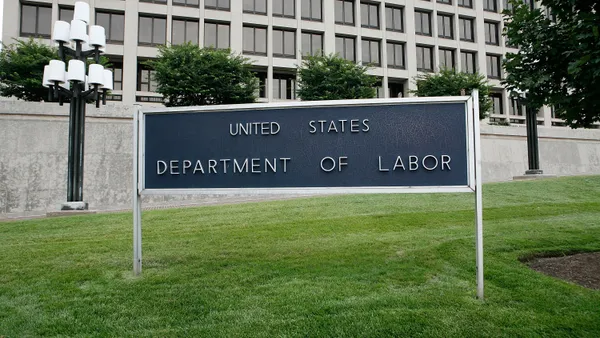Dive Brief:
- Paid parental leave has gained status as a mainstream benefit, according to a new Mercer poll on managing absence and disability. More than 40% of employers surveyed said they offer workers paid parental leave, a 16% increase from Mercer's 2015 survey.
- While more employers offer paid parental leave with both birth and non-birth parents covered, the survey showed that birth parents usually get more time off than non-birth parents. Birth parents receive a median of six weeks while non-birth parents receive four, in general. The average length of leave for either party has not changed since the 2015 survey. In other results, more employers offer paid parental leave for adoptive parents and more allow workers to use their own paid sick leave to care for family members.
- Mercer said in its press release that the rise in employers offering paid parental leave may have been prompted by states and local governments offering this benefit. It advised employers to ensure the effectiveness of their leave plans by: 1) reviewing their current leave policies to make sure they align with statutory mandates; 2) revisiting leave policies to see how they stack up against Mercer's own survey benchmarks; and 3) being aware of changing administration requirements.
Dive Insight:
Paid leave is becoming a vital workplace benefit, mostly because employees need and value it and employers see it as a means of retaining workers, especially in a tight labor market. An Unum poll released in August showed paid family leave is a top work benefit, besides health coverage, because of its mass appeal to all workers with caregiving duties, not just parents. Employers looking for more reason to adopt this benefit will want to know that employers providing paid family and medical leave will receive a new tax credit.
Paid parental leave has caught on with retail employers. Many are offering it to hourly workers in hopes that the benefit will lower the high turnover rates normally associated with the industry. Retailers are beginning to realize, it seems, that hourly workers earning low wages can't afford to take time off and sacrifice pay so they can care for children or other family members. As the current labor market favors workers, retailers are doing everything they can to attract and retain talent.
Companies like PwC have become innovative with their paid parental leave benefits. The company offers a phased return to work program that allows new parents to work 60% of their normal schedules at 100% of their salaries. The plan gives employees extra time to spend with their newborns, while easing them back into their work routines without losing pay.
Of course, the patchwork of state and local mandates covering paid parental leave and other benefits do pose a challenge to employers. Meanwhile, employers need to know which laws apply in the locations where they operate to make sure they comply.












